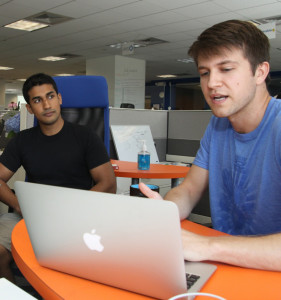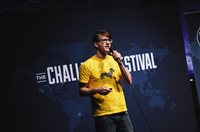Benjamin Levy of eduCanon Wins 1776’s Challenge Cup Competition
Benjamin Levy, the Jewish founder of eduCanon was one of four young entrepreneurs who won 1776’s Challenge Cup competition, which brings regulators and disruptors together. Benjamin Levy’s company eduCanon was a winner in the education category. eduCanon is an online learning environment to build and share interactive video lessons.
Barely six months after it opened its doors in D.C., 1776—a collaborative workspace for startups—announced an eight-month-long quest for the best ideas to revolutionize health, energy, education and urban planning.

The group’s Challenge Cup was open to U.S. as well as international participants with 16 preliminary rounds taking place in seven American cities (Chicago, Los Angeles, New York City, Boston, Austin, Denver and San Francisco) and eight abroad (Moscow, Berlin, London, Sao Paulo, Cape Town, Tel Aviv, Beijing and New Delhi). The Challenge Cup finals and the culminating week-long Challenge Festival were held in the nation’s capital in May.
With thousands of national and international participants competing in four different sectors, the easiest way to wrap your brain around the Challenge Cup may be to think of a March Madness college basketball bracket. 1776 received a total of 5,000 applications from startups in what Co-founder Donna Harris describes as “hard-to-change” regulated industries that need to be “reinvented” and 64 were selected to present during the finals.
The 64 competing groups which traveled to D.C. were comprised of the top four from each regional city round. From there, an “elite eight” competed for the ultimate startup prize package: a chance at a$150,000 investment, exhibitor space at the 2015 International CES® and support from 1776 and its swath of partners. The three remaining category winners are each eligible for a $100,000 investment, as well as exhibitor space at CES. The founders of the four Challenge Cup winners—CancerIQ, Plugsurfing, eduCannon and Grand Prize winner HandUp—are featured in this issue as “The Faces of Innovation.”
In addition to the actual competition, 1776 partnered with several notable tech hubs in D.C. to host its inaugural Challenge Festival. Aspiring to bring together the D.C. community as well as the various startups which traveled to the city, 1776 joined with CEA, iStrategyLabs, Tech Cocktail, the U.S. Chamber of Commerce and others to host seven days of programming throughout Washington. CEA’s sponsorship was a natural continuation of its ongoing partnership with 1776. The Challenge Cup elevated 1776’s work to a global stage, giving CEA the opportunity to expand advocacy for innovation-friendly policies with new members of the startup community, identify potential new CEA startup members and CES exhibitors. In addition, the partnership displayed CEA’s support for the startup community before the media and public policy officials attending the event.
The week’s events ranged from lunchtime conferences to hackathons to evening galas. On the penultimate day of the Challenge Festival, CEA sponsored a day-long forum on the intersection between public policy and entrepreneurship at the U.S. Chamber of Commerce. Featuring an all-star lineup with guests like Uber’s Rachel Holt, D.C. Mayor Vincent Gray, FCC Commissioner Jessica Rosenworcel and the first U.S. Chief Technology Officer Aneesh Chopra, “Startup Government” had a little something for everyone in the audience. Chris Murphy, Mayor Gray’s chief of staff, openly noted “regulation, especially in this town, is a dirty word” and much of the day’s discussions circled back to disruptive technology and how to work proactively with local governments. The lively discussions and active audience engagement helped to educate entrepreneurs unfamiliar with navigating policy—whether at the local, state or federal level—while also letting them know that CEA is on their side.
The Challenge Festival proved to be an excellent venue for bringing regulators and disruptors together. Whether observing a keynote, watching the semi-finals or networking at a gala, attendees were given invaluable access to the world’s hottest startups. And with one of the world’s most powerful cities as the backdrop, entrepreneurs were reminded of the importance of political engagement in determining the lasting success of their startups.
 Here are some Q & A’s with Benjamin Levy of eduCanon:
Here are some Q & A’s with Benjamin Levy of eduCanon:
What inspired you to create eduCanon?
I was in the classroom as a Teach for America Corps member in the San Francisco Bay area and I had 30 kids in a class. It was really hard for me to feel a connection with each of them so I was really excited by the proliferation of one-to-one devices like iPads, and how to best use those as a teacher to connect with my students. I built eduCanon in the mindset of taking traditional instruction—the workflow that teachers already have of delivering material to students—and transforming it into something where it really is a one-to-one experience. So many tools, not in an intentionally negative way, end up displacing a teacher instead of empowering them with their potential.
What is the most challenging part of running a small business?
Running a business is a cake walk compared to running a classroom. Many of us in edtech are former educators and as we get more involved in the business and production side of things, we lose that connection.
How do you define innovation?
In hindsight, it’s not this “grand vision,” but small, incremental steps that are really just the natural progression for growth. This is mostly true for edtech, but it’s the small changes over time, not a complete overhaul. You must win over your audience before you can begin the process for change.